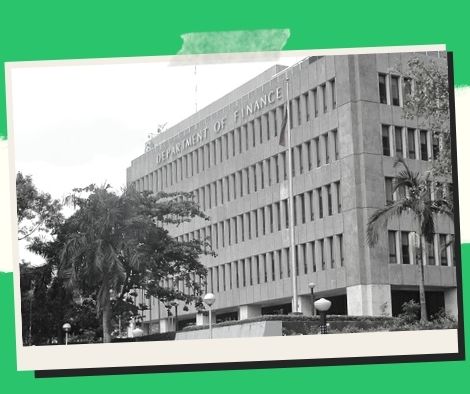
The Department of Finance (DOF) rigorous assessment of PPP contracts reduces the government’s economic risks.
MANILA, Philippines — The Department of Finance (DOF) has conducted a thorough review of about a dozen big-ticket public-private partnership (PPP) contracts to minimize the state’s risks and exposure from contingent liabilities, following President Rodrigo Duterte’s directive to review all contracts “with the end in view of abrogating or revising the provisions that are prejudicial and onerous to the Filipino people.”
The Department of Finance’s extensive review of contracts, which included the Mactan-Cebu Airport Project, Maynilad Water Services Inc. (MWSI) and Manila Water Company (MWC), Cavite-Laguna Expressway (Calax), Clark International Airport Expansion Project, and Metro Rail Transit Line 3, was spearheaded by its Privatization and Special Concerns (PSC) Office (MRT3).
The provisions of the contracts for the Light Rail Transit 1 Cavite Extension and Operations and Maintenance Project, Metro Rail Transit Line 7 (MRT7), Muntinlupa-Cavite Expressway (MCX), North Luzon Expressway-South Luzon Expressway (NLEX-SLEX) Connector Road, Bulacan Bulk Water Supply Project (BBWSP), and Southwest Integrated Transport System (SITS) Phases 1 and 2 were also studied by DOF Undersecretary Grace Karen Sing
In addition to reviewing existing PPP contracts, the PSC Office is now analyzing roughly 40 PPP projects that were submitted to the National Economic and Development Authority (NEDAInvestment )’s Coordination Committee (ICC) under the Duterte administration but have yet to be implemented.
Various implementing agencies granted original proponent status (OPS) to these PPP bids (IAs).
The ICC mandated the review of information given by the respective IAs to the ICC, as well as the financial, technical, and legal capabilities of private proponents to carry out their individual proposals, in a resolution released in November 2021.
According to Singson’s report to Finance Secretary Carlos Dominguez III, the PSC Office also made significant contributions to the amendments to the implementing rules and regulations (IRR) of the build-operate-transfer (BOT) law, with the goal of managing fiscal risk and providing transparency in government contingent liabilities from PPP projects that could unnecessarily burden taxpayers.
The detailed examination of these PPP projects by the DOF’s PSC, according to Dominguez, is a first for the government in terms of transportation and other big-ticket endeavors handled by the private sector.
“Such a thorough examination of PPP projects, which we hope to institutionalize for the ultimate benefit of our people,” Dominguez said, “would ensure that the government is free of undue risks or contingent financial liabilities that would, in the end, have to be borne by the public in the form of higher taxes or higher fees charged by concessionaires for the use of their facilities until they are turned over to the state.”
Singson’s office also proposed that the NEDA Board adopt a resolution to formalize the assessment of risks, government guarantees, and contingent liabilities in the consideration of project proposals that come before it for approval, according to Singson.
The PSC has recommended the construction of a Risk Management Office (RMO) to examine risks, government guarantees, and contingent liabilities in the state’s joint ventures with the private sector under the PPP model in order to increase the government’s capabilities in analyzing contingent liabilities.
After a study of the current risk management program, Singson concluded that it was being carried out solely by an ad hoc technical working group (TWG) that lacked the requisite mandate and resources to review PPP contracts.
Provisioning for contingent liabilities is based on predicted termination payments, which is a low-probability occurrence, and does not account for real claims that concessionaires often seek throughout the implementation of PPP projects.
According to the proposal, the RMO will identify and evaluate contingent liabilities and other risks assumed by the government through national government agencies (NGAs) and government-owned corporations (GOCCs) in relation to PPP projects; recommend risk mitigation measures; assist the Development Budget Coordination Committee (DBCC) in the implementation of the risk management program; and strengthen the evaluation of proposals requiring sovereign guarantees and concessionaire claims.
Aside from PPP contract evaluation, the PSC Office advocated for the passage of a coconut industry law, which would directly assist the country’s 2.5 million small coconut farmers and protect the multibillion-peso coconut tax fund from abuses by establishing a Trust Fund Management Committee.
Save/Share this story with QR CODE
Disclaimer
This article is for informational purposes only and does not constitute endorsement of any specific technologies or methodologies and financial advice or endorsement of any specific products or services.
 Need to get in touch?
Need to get in touch?

We appreciate your reading. 
1.) 

Your DONATION will be used to fund and maintain NEXTGENDAY.com
Subscribers in the Philippines can make donations to mobile number 0917 906 3081, thru GCash.
3.) 
4.) 
AFFILIATE PARTNERS

World Class Nutritional Supplements - Buy Highest Quality Products, Purest Most Healthy Ingredients, Direct to your Door! Up to 90% OFF.
Join LiveGood Today - A company created to satisfy the world's most demanding leaders and entrepreneurs, with the best compensation plan today.

 Business, Finance & Technology
Business, Finance & Technology

 Business Technology, Finance Technology & Information Technology
Business Technology, Finance Technology & Information Technology





